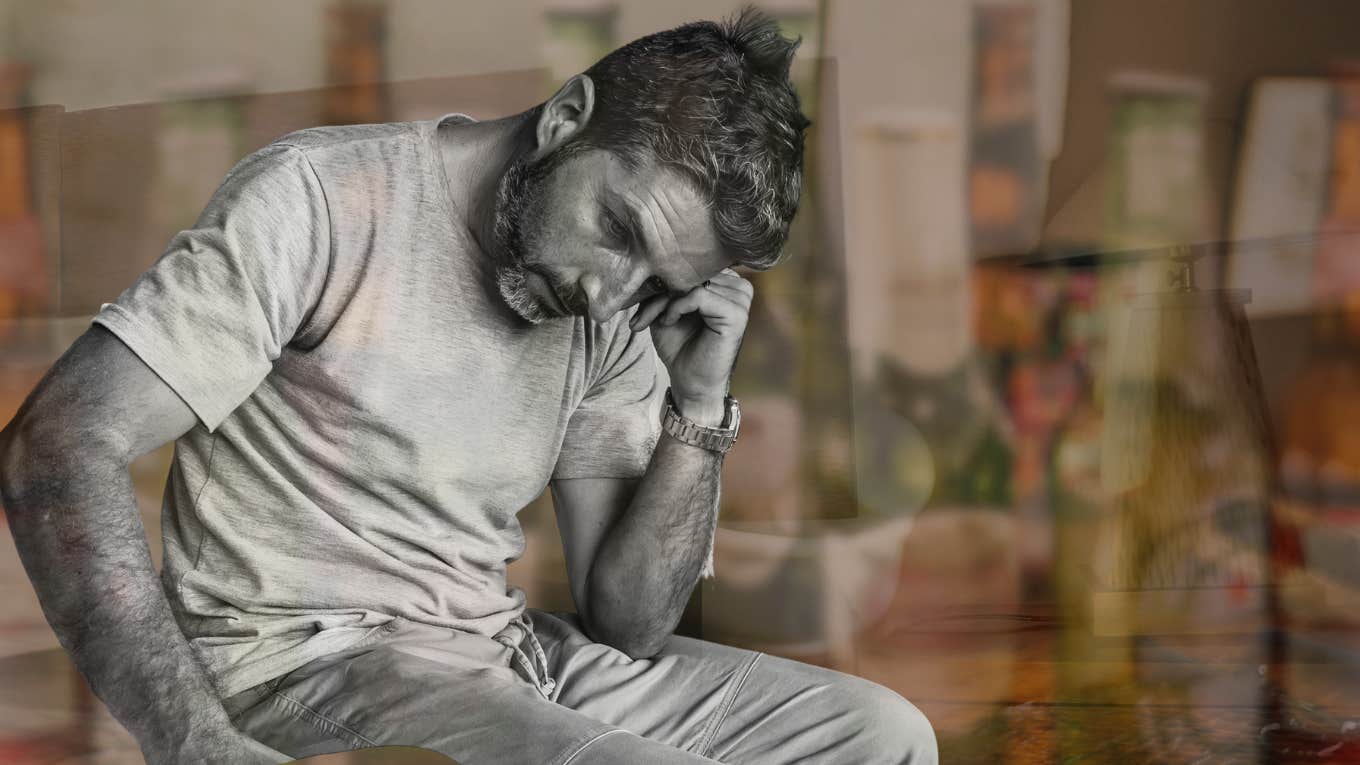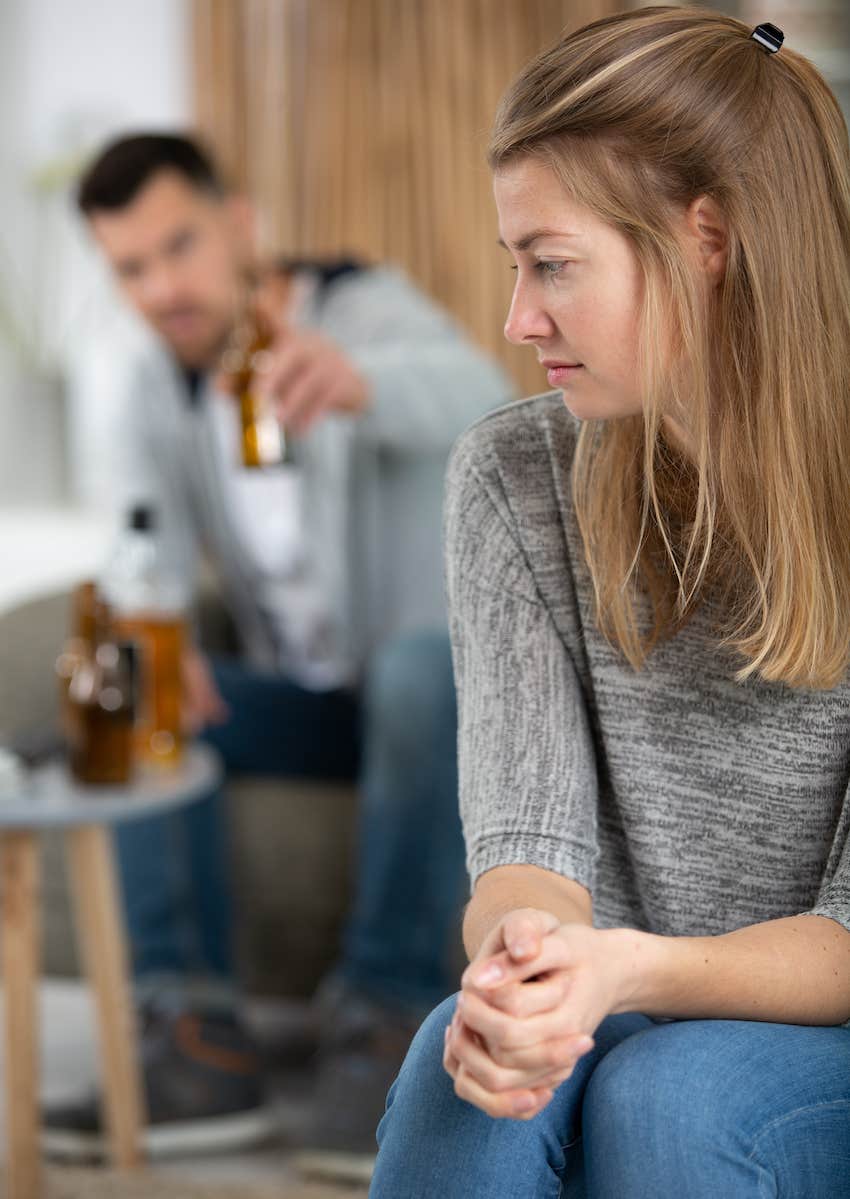I Loved My Wife — But I Loved Alcohol More
The real choice is between two pains.
 Edward Eyer, Marcos Calvo | Canva
Edward Eyer, Marcos Calvo | Canva I am often asked this tough question: “If you love her you'd never hurt her, so if drinking causes her pain and you do it anyway, then it must mean you don't love her, right?"
Well actually, wrong. Did I love my wife? Yes. Did I love her well? Sometimes, but rarely when I was drinking.
Did I love alcohol more than my wife? It's easy to see how it could seem that way.
My wife constantly pleaded with me to not drink, not drink too much, or to not go out at all — I'd still go out, drink too much, and get drunk. Then I chose alcohol over my wife, so by logical deduction, I must love alcohol more than my wife. Point proven, case closed.
 Alpa Prod vis Shutterstock
Alpa Prod vis Shutterstock
My relationship with alcohol was complicated. In my early days of drinking, I felt like I found the answer to life, the universe, and everything in it. For someone like me who had a social phobia, suffered from low self-esteem, and was terrified of women rejecting me, alcohol was a wonder drug.
So did I love it? I loved the way it made me feel. I loved that I could talk to people without feeling clumsy and stupid. I loved that it made me attractive to women (that was a lie, but I was more than happy to believe it).
As time progressed and I started to drink increasing amounts to achieve the same effects and do things that made me ashamed, the love affair with alcohol dimmed slightly. Oh, I still loved the effect, no doubt, but I was less eager to pay the price.
I did still want to rid myself of the social fear, but I didn't want to become an arrogant boor. I didn't want to get into arguments, be insulting, self-righteous, and patronizing. I didn't want to get into fights or get thrown out of parties, clubs, pubs, or anywhere.
But I did love the feeling of not being afraid of my life and the people in it.
If that'd been the only choice, it would have been easier to give up the booze and be a better husband, but it was more complicated for me. The alcohol still took away my fear and made me feel popular, attractive, sexy, and smart.
But when those feelings wore off, I didn't just return to being the nervous, socially clumsy man I was when I started drinking. When I was sober, any confidence I had was gone and my fear was heightened.
Drinking again took the fear away and brought the confidence back, but with each binge, it felt like I started drinking from deeper fear and it took more and more alcohol just to get rid of the fear — never mind feel the confidence.
As a binge progressed my ability to resist drinking was eroded until it felt like I would die or go insane if I did not get a drink. Did I love alcohol at that time? No, I hated it, I hated what it made me do, say, the way I behaved.
I hated alcohol, but I had to have a drink. It felt like I had no choice.
Members of Alcoholics Anonymous talk about the compulsion to drink and being powerless to stop. On my worst days, I would hallucinate and even have convulsions and my mind was filled with terror.
At those times, I was withdrawing from a binge when mentally and physically I felt so bad, the only thing I could think about was to feel better. The only thing I knew that could make me feel better was another drink.
I knew I would probably not be able to keep the alcohol down, I would be sick, I would sweat and shake and feel deeply ashamed. I knew no sane person would put themselves through this, yet here I was doing it — again! I swore once more, that if I just got out of this I would never drink again, well not as much anyway. Some of you will probably have no sympathy for my plight and will say it was all self-inflicted.
I'm not looking for sympathy, not for me anyway.
And, yes, I do have to agree that no one made me do it. Some of you may think I am just making excuses for my inexcusable behavior, but I’m not. I'm just trying to explain in part, not condone, what I did. I'm deeply sorry for what I did. I wish it could have been different.
Did I love my wife? Yes but not as well as I could have and certainly not nearly as well as she deserved. I never wanted to hurt her, or anyone, I just did not want to hurt.
Let me step back out of the alcoholic role and back into the academic for a moment. What does this insight into addiction tell us about the nature of love and the alcoholic? One of the main lessons I try to teach people is to try not to take the apparent rejection personally.
Whoa, that’s a tall order, I know, how can you not take it personally? Well, the fact is the choice is not between you and alcohol, even though they may continue to drink when you have pleaded with them to stop. That seems very personal indeed and it is difficult to be objective.
However, the real choice is between two pains. Unfortunately, the alcoholic will often choose the lesser pain. When I was withdrawing I was filled with pain and fear and I was terrified of what might happen if I didn't get a drink. However I felt huge guilt about the hurt I was causing my wife, but that was a lesser hurt for me. Unfortunately, the choices alcoholics and addicts often make are based on receiving instant gratification rather than long-term growth.
Drug and alcohol addiction is incredibly common.
The Substance Abuse and Mental Health Services Administration (SAMHSA) reports that approximately 20.3 million people above the age of 12 have suffered from a substance use disorder in the past year. According to SAMHSA’s 2018 National Survey on Drug Use and Health, close to 2 million people of the same age bracket have suffered from opioid use disorders and 14.8 million from alcohol use disorders.
If you or someone you know is suffering from addiction, there are resources to get help.
The process of recovery is not linear, but the first step to getting better is asking for help. For more information, referrals to local treatment facilities and support groups, and relevant links, visit SAMHSA’s website. If you’d like to join a recovery support group, you can locate the nearest Alcoholics Anonymous or Narcotics Anonymous meetings near you. Or you can call SAMHSA’s National Helpline at 1-800-799-7233, which is a free 24/7 confidential information service in both English and Spanish. For TTY, or if you’re unable to speak safely, call 1-800-487-4889.
John McMahon has a PhD in Psychology and was a senior lecturer on alcohol and drug studies. Lou Lewis is a Counselor and author of the book 'No Easy Answers'.

